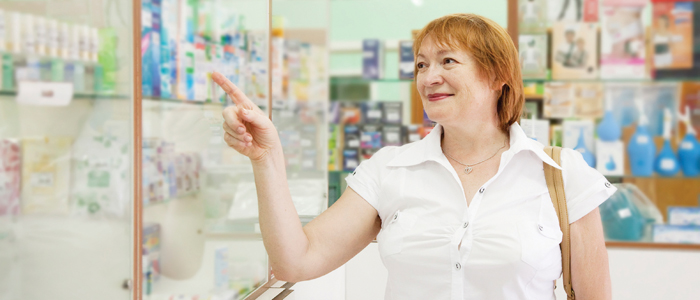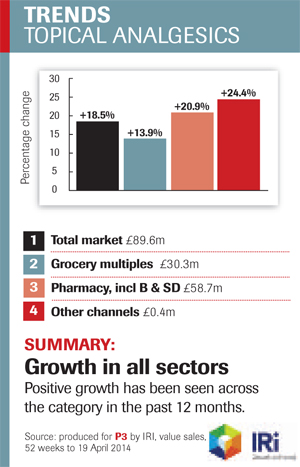An active older age market
Record learning outcomes
Products and services aimed at senior customers should be developing rapidly, if you are to respond to national trends
Average life expectancy in the UK is now 78 years for men and 82 years for women, according to the latest figures from the Office for National Statistics (ONS). Better healthcare means five times as many people now reach 100 than they did in the 1980s. But while the growing number of older people among the population is cause for celebration, it’s also putting extra strain on healthcare and social services.

General attitudes towards older people and healthcare provision need to change rapidly in response to these trends. More than three- quarters of adults are looking forward to living longer, yet more than four out of five adults believe negative perceptions of later life need to change, a survey by Age UK revealed in March this year. A larger older population wants to lead an active life into older age and this is an expanding opportunity for pharmacy.
According to David Goodwin, designer at Flexyfoot, the company that has redesigned the walking stick ferrule for modern living, pharmacies must take care to keep pace with the needs of the older generation. ‘Instead of marketing to them as old people, talk about how they can keep younger and more active for longer,’ he says. ‘Pharmacies should be stocking more products that fit with how older people see themselves and providing them with the tools to be that for longer, in the best health they can be.’
Falls prevention
As people get older, their sense of balance may decline. About one in three adults over 65 who lives at home will have at least one fall a year, and about half of these will have more frequent falls, according to NHS Choices. The annual National Falls Awareness week, led by Age UK, was held last month, and the charity has a range of materials aimed at helping people to stay steady on their feet, go to www.ageuk.org.uk.
Activa Healthcare’s 2014 Keep Active with Activa campaign, led by presenter Angela Rippon, aims to help people keep mobile and independent, with an emphasis on foot care.  ‘Those dull aches and pains, that are so often ignored, can often be the warning that more serious issues such as varicose veins, leg ulcers and long-term swelling are developing,’ says Kimby Osborne, leg health expert at Activa Healthcare. ‘These conditions can often be prevented, and the aches and pains relieved, with compression hosiery.’ Activa Healthcare has launched a free app that allows pharmacists to assess which compression hosiery is most suitable for their customer.
‘Those dull aches and pains, that are so often ignored, can often be the warning that more serious issues such as varicose veins, leg ulcers and long-term swelling are developing,’ says Kimby Osborne, leg health expert at Activa Healthcare. ‘These conditions can often be prevented, and the aches and pains relieved, with compression hosiery.’ Activa Healthcare has launched a free app that allows pharmacists to assess which compression hosiery is most suitable for their customer.
Flexyfoot has launched a full range of walking sticks, poles and crutches with a variety of handle options and fitted with the Flexyfoot ferrule as standard, to help shift that ‘old’ perception of walking aids. ‘It’s a very scary prospect for many when their confidence is knocked due to feeling unsteady on their feet, to keep moving and stay active,’ says Mr Goodwin. The product offers real benefits in pain relief and improved confidence in walking, he claims. ‘Not only does the Flexyfoot range move away from the institutional look and feel of old-fashioned NHS-standard walking sticks and crutches, but it maximises the ergonomic design for both style and comfort.’
AgeUK offers toenail cutting services for a fee for people over the age of 50. ‘An annual foot health check is as important as a sight or hearing test,’ says Mike O’Neill, consultant podiatrist, in the charity’s advice to older people.
Eye health
Cataracts, age-related macular degeneration (AMD) and glaucoma are common causes of sight loss as people get older. The Royal College of General Practitioners has recently launched a dedicated programme for eye health, with a focus on ageing and sight loss, as a UK-wide clinical priority, says Michelle Sutton, pharmacist forâ£Butterflies Healthcare, eye care and eye wear specialists. ‘Regular eye tests and keeping glasses up to date are  important as well as an optical tomography (OCT) scan. Anyone diagnosed with dry macular degeneration should take a macular supplement containing the exact ingredients and doses known as the AREDS2 formula (such as Viteyes 2). AREDS2 is a clinical trial published last year that fine-tuned the original formula, proven to reduce the risk of progression of AMD by 25 per cent. In addition, a general eye health supplement (such as Eye Essentials) may be considered by anyone over 50 in high-risk groups, including those who smoke or who have smoked, have a family history of AMD, have been exposed to UV rays from long-term sunlight exposure or who struggle to eat a diet rich in fruits and vegetables.’
important as well as an optical tomography (OCT) scan. Anyone diagnosed with dry macular degeneration should take a macular supplement containing the exact ingredients and doses known as the AREDS2 formula (such as Viteyes 2). AREDS2 is a clinical trial published last year that fine-tuned the original formula, proven to reduce the risk of progression of AMD by 25 per cent. In addition, a general eye health supplement (such as Eye Essentials) may be considered by anyone over 50 in high-risk groups, including those who smoke or who have smoked, have a family history of AMD, have been exposed to UV rays from long-term sunlight exposure or who struggle to eat a diet rich in fruits and vegetables.’
MacuShield Gold, another AREDS2-compliant nutritional supplement, has just been launched in pharmacies. According to Dr Mark Kirby, scientific advisor to MacuVision, glare discomfort is a common problem. ‘Glare discomfort results from exposure to blue’ light,’ he says. ‘The eye defends itself from blue light using a yellow pigment, known as macular pigment, which filters out this particular portion of light. However, the yellow macular pigment is composed of dietary-derived nutrients – lutein, zeaxanthin and meso- zeaxanthin, which must be attained from a diet rich in green leafy vegetables. Many glare sufferers may simply be deficient in these important pigments and would benefit from increasing intake of green vegetables and/or supplementation.’ Lutein, zeaxanthin and meso-zeaxanthin are in the MacuShield product.
Heart support
Nutritionist Rita Arora, managing director of Nutripharm, says that cardiovascular disease and, in particular, high cholesterol is one issue that older people are facing more than ever. ‘The cholesterol debate, and in particular how we treat it with statins, is continuing to rage within the media,’ she says. ‘There is generally poor understanding of what cholesterol is, and most people aren’t aware that there is both a good and bad type of cholesterol. It’s because of this that clients do as they’re told and start statin medication, without really understanding what they can do to help themselves with diet.’ Perfect Vascular Natural is a new pharmaceutical-grade product from the company based on a patent- approved combination of red yeast rice, plant sterols and CoQ10.
Joint care
According to Arthritis Care, one in five of the UK population suffers from joint problems. ‘With age come aches and pains, which can have a serious impact on older people, restricting their home and social lives,’ says Elvy Mardjono, senior product manager for Deep Relief. ‘The appropriate use of topical analgesics can be an effective and attractive option when dealing with aches and pains, especially for those who can’t take pills or prefer not to take them. A topical NSAID, such as Mentholatum’s Deep Relief, can be applied at the point of pain to relieve discomfort. The 100g pharmacy-only pack can be recommended for non-serious arthritic conditions. A new pharmacy detailing pack includes a shelf tray, showcard and consumer leaflets to go on counter displays.’
Nutritional support
As people get older, it’s natural to eat less or be less interested in food. However, it’s still important that they get all the nutrients their body needs. ‘Pharmacies are well placed to explain that as we age it’s essential that a wide range of vitamins and minerals is included in our daily diet to protect the body from the natural ageing processes,’ says Robert Taylor of Vitabiotics.
The Vitabiotics range includes supplements specifically targeted at the older audience, with something suitable for everyone based on their age, gender and health concerns, he says. If dietary intake is insufficient in nutrients he recommends Vitabiotics Wellwoman 70+and Osteocare Original for bone health.
Comment
 Lila Thakerar, Shaftesbury Pharmacy, Harrow ‘Women tend to be more conscious of ageing than men and advice is sought from the pharmacy regarding skin, hair, nails and general PMT and menopausal symptoms. There is a wide range of products that can be freely displayed for customers to browse and read the information. Supplements are in demand throughout the year and should be adequately stocked on the shelves. Vitabiotics and HealthAid have an excellent range of products to suit all ages and lifestyles. Antioxidants is a growing market because people are becoming aware of the importance of removing free radicals from their bodies.’
Lila Thakerar, Shaftesbury Pharmacy, Harrow ‘Women tend to be more conscious of ageing than men and advice is sought from the pharmacy regarding skin, hair, nails and general PMT and menopausal symptoms. There is a wide range of products that can be freely displayed for customers to browse and read the information. Supplements are in demand throughout the year and should be adequately stocked on the shelves. Vitabiotics and HealthAid have an excellent range of products to suit all ages and lifestyles. Antioxidants is a growing market because people are becoming aware of the importance of removing free radicals from their bodies.’
 Dilip Patel, Mirage Pharmacy, Handsworth ‘When a customer asks for advice about how to age well, I give them general healthy living tips such as eating five portions of fruit and vegetables every day, to drink plenty of water and to try to take as much exercise as possible. It doesn’t have to be vigorous exercise: brisk walking four or five times a week is beneficial to a customer’s health. We’re in an inner city area where people don’t have a disposable income for expensive anti- ageing products and skin creams, and I find it difficult to recommend products where it’s unclear whether it will live up to a customer’s expectations. One area we do concentrate quite heavily on is omega 3 fish oil, because anyone over the age of 50 would benefit from taking it. Vitamin and mineral supplements have some general interest all year round for us.’Â
Dilip Patel, Mirage Pharmacy, Handsworth ‘When a customer asks for advice about how to age well, I give them general healthy living tips such as eating five portions of fruit and vegetables every day, to drink plenty of water and to try to take as much exercise as possible. It doesn’t have to be vigorous exercise: brisk walking four or five times a week is beneficial to a customer’s health. We’re in an inner city area where people don’t have a disposable income for expensive anti- ageing products and skin creams, and I find it difficult to recommend products where it’s unclear whether it will live up to a customer’s expectations. One area we do concentrate quite heavily on is omega 3 fish oil, because anyone over the age of 50 would benefit from taking it. Vitamin and mineral supplements have some general interest all year round for us.’Â
 Nemesh Patel, AMG Pharmacy, Braintree ‘I believe our profession does a fantastic job in supporting and providing advice to millions of elderly people in the UK. Our pharmacy has developed links with Age UK Essex and has organised fundraising activities in our pharmacy to raise awareness in the community. We’ve also held Healthy Living events in local residential homes, measuring blood pressure and calculating BMIs to let the community know what our pharmacy can do for them. I would urge all pharmacy teams to do this and establish relationships within the community as it enhances the reputation of your pharmacy and raises the confidence that your customers and their families will have in your pharmacy.’
Nemesh Patel, AMG Pharmacy, Braintree ‘I believe our profession does a fantastic job in supporting and providing advice to millions of elderly people in the UK. Our pharmacy has developed links with Age UK Essex and has organised fundraising activities in our pharmacy to raise awareness in the community. We’ve also held Healthy Living events in local residential homes, measuring blood pressure and calculating BMIs to let the community know what our pharmacy can do for them. I would urge all pharmacy teams to do this and establish relationships within the community as it enhances the reputation of your pharmacy and raises the confidence that your customers and their families will have in your pharmacy.’
